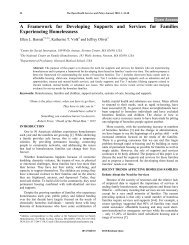international conference on street children and street children's
international conference on street children and street children's
international conference on street children and street children's
You also want an ePaper? Increase the reach of your titles
YUMPU automatically turns print PDFs into web optimized ePapers that Google loves.
But families cannot be strengthened in the midst of poverty, human degradati<strong>on</strong><br />
<strong>and</strong> destituti<strong>on</strong>. Neither can families become pillars of strength in face of increasing<br />
injustice, inequality <strong>and</strong> income disparities. The problem of <strong>street</strong> <strong>children</strong> will become<br />
less pr<strong>on</strong>ounced if families <strong>and</strong> countries could overcome poverty. Justice <strong>and</strong><br />
equitable distributi<strong>on</strong> of resources is likely to have a positive impact <strong>on</strong> the problem of<br />
<strong>street</strong> <strong>children</strong>. At the level of the family, parents <strong>and</strong> guardians must take resp<strong>on</strong>sibility<br />
for their <strong>children</strong> by providing a c<strong>on</strong>ducive envir<strong>on</strong>ment free of neglect, violence <strong>and</strong><br />
abuse. The shameful exploitati<strong>on</strong> of <strong>children</strong> by parents <strong>and</strong> their families can <strong>on</strong>ly lead<br />
to more <strong>children</strong> <strong>on</strong> our <strong>street</strong>s. Collaborati<strong>on</strong> between parents, schools, the community<br />
<strong>and</strong> government will lead to viable soluti<strong>on</strong>s to the problem of <strong>street</strong> <strong>children</strong>.<br />
The Role of N<strong>on</strong>- Governmental Organizati<strong>on</strong> (NGOs) in<br />
Addressing the Problem of Street Children:<br />
In recent years, innovative work for <strong>street</strong> <strong>children</strong> has been almost the exclusive<br />
preserve of the private sector: In many of the worst affected countries, notably Brazil,<br />
NGO projects, executed mostly by religious groups <strong>and</strong> mostly all underfunded <strong>and</strong><br />
overworked, have developed new ways to help <strong>street</strong> <strong>children</strong>. Their programmes are<br />
less expensive, more humane <strong>and</strong> more affective alternatives to instituti<strong>on</strong>alizati<strong>on</strong>.<br />
Whether the political will exists to duplicate these innovative programmes is another<br />
matter. While NGOs are to be applauded in their efforts to address the problem of <strong>street</strong><br />
<strong>children</strong> there is need to scrutinize the role of many of these NGOs <strong>and</strong> the extent to<br />
which they c<strong>on</strong>tribute to solving the problem of <strong>street</strong> <strong>children</strong>.<br />
There is todate an increasing number of <str<strong>on</strong>g>internati<strong>on</strong>al</str<strong>on</strong>g> <strong>and</strong> local based NGOs with the<br />
supposed aim of helping <strong>and</strong> protecting <strong>street</strong> <strong>children</strong>. Indeed the welfare of <strong>children</strong> <strong>and</strong> their<br />
rights is a fast growing industry attracting huge amount of m<strong>on</strong>ey aimed to go towards improving<br />
the welfare of <strong>children</strong> in Africa. The reality is often <strong>on</strong>e in which many of these NGOs do not<br />
advance the interests of <strong>children</strong>. M<strong>on</strong>ey is often diverted to other activities instead of addressing<br />
17
















